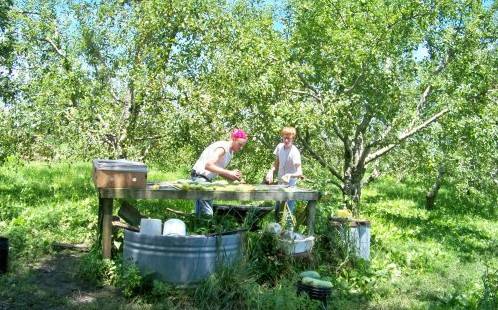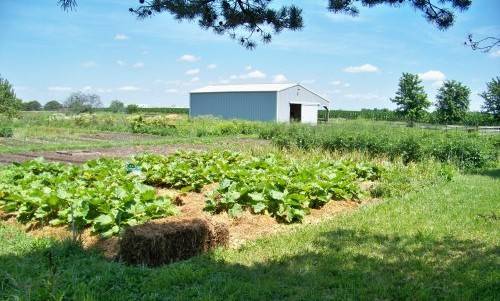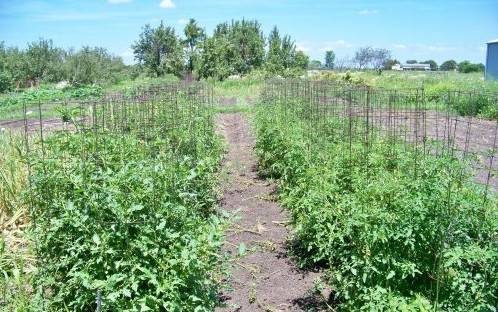 Thank goodness the heavens unleashed some cooling rain this week so my visit to Brackett Farm wasn’t the uncomfortable, sweaty venture it could well have been. On Wednesday afternoon, I visited Bob Brackett at his farm in Bondville, Illinois. Just over the I-72 overpass outside of Champaign, Brackett has turned a patch of land off the interstate into an independently operated Community Supported Agriculture (CSA) farm. He also sells his fruits and vegetables Saturday mornings at Urbana’s Market at the Square.
Thank goodness the heavens unleashed some cooling rain this week so my visit to Brackett Farm wasn’t the uncomfortable, sweaty venture it could well have been. On Wednesday afternoon, I visited Bob Brackett at his farm in Bondville, Illinois. Just over the I-72 overpass outside of Champaign, Brackett has turned a patch of land off the interstate into an independently operated Community Supported Agriculture (CSA) farm. He also sells his fruits and vegetables Saturday mornings at Urbana’s Market at the Square.
I was particularly keen to visit the Brackett Farm after learning that it is a CSA. A couple of years ago, my best friend, who lives in Pittsburgh, told me she joined some sort of vegetable subscription service, where each Wednesday when she comes home from work, the produce fairy has visited her doorstep with a box of fresh, locally-produced fruits, vegetables, and eggs.
I’m not normally prone to fits of foodstuff envy, but this was just after I had moved to the CU, and, unaccustomed to the vast amounts of farmland, seemingly little of which was for human digestive consumption, became enraged that someone who lives on the top of a mountain in the middle of a city had more access to fresh local food than I did. Not to mention front-door service. So when I ran across the Brackett Farm, first through their website, then through a visit to Champaign’s First Street Market, it became clear to me that such a program does exist here in town, and I was eager to find out more.
The basic idea behind a CSA is that the farmer — and the farmland — has an equal footing and equal stakes with those that by shares in the CSA. For an annual fee, the members enjoy seasonal foods that the farmer dispenses to its shareholders. Thus, the risk of loss is reduced for the farmer (he has money upfront from shareholders to invest in crops and labor), and shareholders know the source of their food. The philosophy itself sprang from the fields of European farmers as early as the 1920s, and was popularized in Japan and Chile during the 1970s. In 1986, this approach was adopted in the United States at two New England farms. Since that time, this cooperative approach to farm ownership has spread across the country.

Brackett began his farm in the early 1980s, and joined a local CSA just forming in 1995 with another farmer (at that time, he had already been a seller at the Market for about seven years.) In an Orwellian twist, the members of that CSA had interests which often conflicted in ways that made no one happy. For instance, surveys would go out to members to determine which foods should or should not be included in the next growing season, and there were always equal numbers to either vote an item out or keep it in. Such direct democracy partly inspired Brackett to start his own CSA in 2000, and he has been the sole grower and manager ever since.
And it is a business for which Brackett has both passion and great competency. He could name the strains of gooseberries, blackberries, tomatoes, and onions, pointing out each variety and explaining how it compares to others he grows. He described the difference in flavor of two different pears in the orchard, and knew exactly how often his strawberry fields render a crop. However, his self-determination and expertise do little to relieve the threats of the natural world, and Brackett still contends with flooding, vermin, and extremes of temperature. With so many unknowns, the CSA revenue provides a buffer against the natural elements that could cut into profitability and sustainability for his business.
The operation is still a small one, although it is a far cry from its start as a backyard garden plot.
Expanding over twenty-seven years, Brackett currently employs around ten farmhands (coincidentally, all of his sons have worked or do work on the farm), and supports more than thirty CSA members, in addition to his weekly patrons at the Market. When I asked him which of his crops is his favorite among those he brings to the public, he responded like I was asking him to pick a darling child: “I don’t grow anything I don’t like,” he says.

Photos used permission of Brackett Farms.








